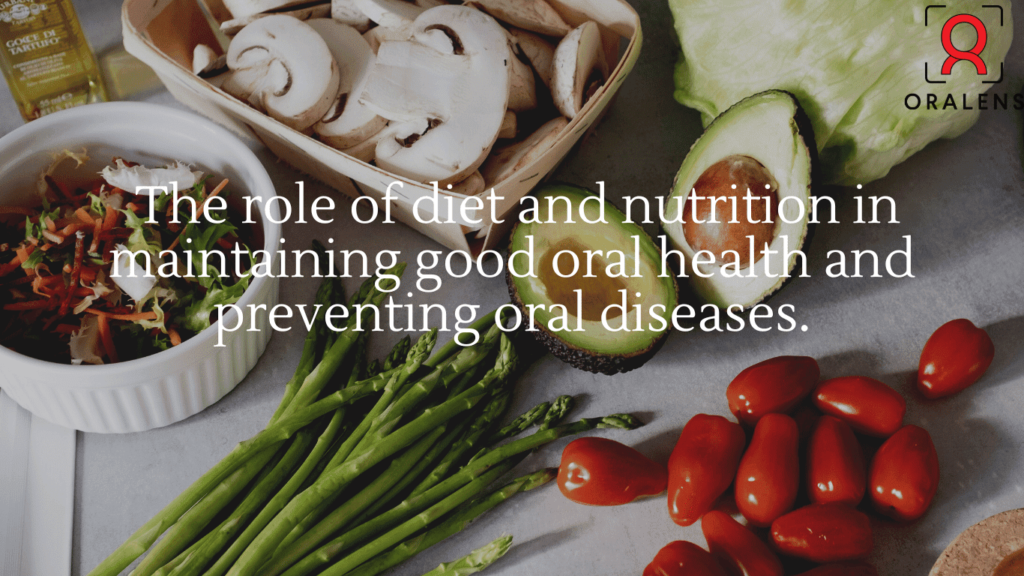
The role of diet and nutrition in maintaining good oral health and preventing oral diseases.
The role of diet and nutrition in maintaining good oral health and preventing oral diseases is often overlooked, but it is an important aspect of overall health and well-being. In this article, we will take a closer look at how the foods we eat can impact our oral health, as well as provide some tips for maintaining good oral health through proper diet and nutrition.
The Importance of a Balanced Diet
A balanced diet is essential for maintaining good oral health. Eating a variety of fruits, vegetables, whole grains, and lean proteins can help to keep your teeth and gums healthy and strong. These foods are packed with essential vitamins and minerals, such as calcium, phosphorus, and vitamin D, that help to build and maintain optimal oral health.
In addition to providing essential nutrients, a balanced diet can also help to neutralize the acid that can build up in your mouth. This acid is produced by the bacteria that live in your mouth, and it can lead to tooth decay and gum disease if left unchecked. By eating a diet that is rich in fruits and vegetables, you can help to reduce this acid and keep your mouth healthy.
The Dangers of Sugary and Starchy Foods
While a balanced diet is important for maintaining good oral health, it is also important to limit your intake of sugary and starchy foods. These foods can create an environment in your mouth that is conducive to the growth of harmful bacteria, which can lead to tooth decay and gum disease.
Sugar, in particular, is a major culprit when it comes to dental diseases. When you eat sugary foods, the bacteria in your mouth feed on the sugar, producing acid as a byproduct. This acid can erode tooth enamel, leading to cavities and other forms of tooth decay.
Starchy foods, such as bread, crackers, and chips, can also be harmful to your oral health. When these foods are broken down in your mouth, they turn into simple sugars that can feed the harmful bacteria in your mouth. This can lead to an increase in the production of acid, which can damage your tooth enamel and cause dental diseases.
To maintain good oral health, it is important to limit your intake of sugary and starchy foods. This means avoiding candy, cookies, and other sweet treats, as well as limiting your intake of bread, crackers, and chips. By making these simple changes to your diet, you can help to prevent dental diseases and keep your mouth healthy.
The Importance of Water
In addition to eating a balanced diet, it is also important to drink plenty of water. Water helps to wash away food particles and bacteria, and it can also help to neutralize the acid in your mouth. This is especially important after eating sugary or acidic foods, as these can increase the acidity in your mouth and lead to dental diseases.
By drinking water regularly throughout the day, you can help to keep your mouth clean and healthy. This is especially important if you live in a dry climate or if you are participating in activities that cause you to lose a lot of fluids, such as exercise or outdoor activities.
Dietary Considerations for Vegetarians and Non-Vegetarians
For vegetarians, it is important to make sure that you are getting enough protein and calcium in your diet. These nutrients are essential for maintaining strong teeth and healthy gums, and they can be found in a variety of plant-based foods.
Good sources of protein for vegetarians include beans, lentils, nuts, and tofu. These foods are not only high in protein, but they are also rich in other essential nutrients, such as fiber and vitamins.
In addition to protein, vegetarians also need to make sure they are getting enough calcium in their diet. Calcium is essential for maintaining strong teeth and healthy gums, and it can be found in a variety of plant-based foods, such as leafy green vegetables, nuts, and dairy alternatives.
For non-vegetarians, it is important to limit your intake of acidic foods and drinks. These can erode tooth enamel and make your teeth more susceptible to decay. Examples of acidic foods and drinks include citrus fruits, sports drinks, and carbonated beverages.
It is also important to avoid smoking, as this can increase your risk of developing oral cancer and other serious health problems. Smoking can also cause bad breath and stain your teeth, making them more likely to develop cavities and other forms of tooth decay.
Tips for Improving Oral Health through Diet and Nutrition
There are several steps you can take to improve your oral health through diet and nutrition. Some of these tips include:
- Brush and floss regularly: Brushing and flossing are essential for removing food particles and bacteria from your mouth, and they should be done at least twice a day.
- Drink plenty of water: Water helps to wash away food particles and bacteria, and it can also help to neutralize the acid in your mouth. Aim to drink at least eight glasses of water per day.
- Limit your intake of sugary and starchy foods: These foods can create an environment in your mouth that is conducive to the growth of harmful bacteria, leading to tooth decay and gum disease.
- Avoid acidic foods and drinks: These can erode tooth enamel and make your teeth more susceptible to decay. Examples include citrus fruits, sports drinks, and carbonated beverages.
- Don’t smoke: Smoking can increase your risk of developing oral cancer and other serious health problems. It can also cause bad breath and stain your teeth.
By following these simple tips, you can improve your oral health and reduce your risk of developing dental diseases. A healthy diet and good oral hygiene are essential for maintaining good overall health and well-being.

